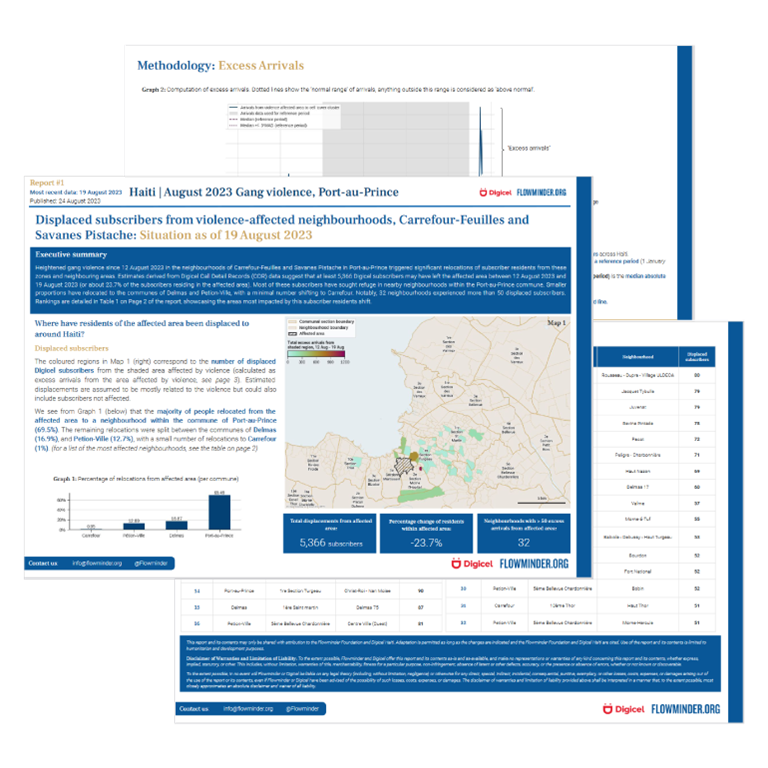This page lists the resources and additional information supporting its entry for a GLOMO Award, category 4b: Best Mobile Innovation supporting Emergency or Humanitarian Situations
Solution outputs | Concise and easy-to-use reports on population displacements using anonymised mobile operator data
Flowminder has made substantial contributions to the response to gang violence in Haiti in August-September 2023, providing easy-to-use, timely and informative insights on population displacements following heightened gang violence.
Four reports were made publicly available, and released in both English and French:
- Carrefour-Feuilles and Savanes Pistache - Report 1
- Carrefour-Feuilles and Savanes Pistache - Report 2
- Carrefour-Feuilles and Savanes Pistache - Report 3
- Mirebalais and Saut d'Eau - Report 1
Two data + viz outputs were also communicated to stakeholders via email.

Use and impact on decision-making | Full quotes
“I sincerely appreciate the thorough and well-crafted report your team provided. Its quality and relevance are truly commendable. I intend to distribute this report to our partners today and assure you that any additional inquiries or comments that arise will be promptly shared with you."
— Fania Joseph, Executive Director at AGERCA (Alliance pour la Gestion des Risques et la Continuité des Activités), Haiti (translated from French)
“[...] This analysis gives us an indication of where to prioritise our DTM field assessments and surveys to deepen our understanding of the profiles and needs of displaced people and others on the move. For example, recent Flowminder analyses have indicated that there is a trend of a number of Digicel users fleeing the Port-au-Prince Metropolitan Area for the South of the country. We have therefore launched in-depth DTM assessments in this area in order to obtain more information about the displacement situation there.
— Yakin Mwanza, Data and Research Unit Coordinator at IOM-DTM, Data Management Unit (translated from French)
Solution methods & development | Enhanced and robust scientific methods for estimating human mobility from mobile operator data
The solution provided by Flowminder to support humanitarian actors is the estimation of population displacements across Haiti following heightened episodes of gang violence in specific areas of the country, using mobile operator data.
Flowminder processes and analyses anonymised Call Detail Records (CDR data) to produce estimates of internal human mobility and migration in a country. CDRs are a type of information routinely recorded by mobile network operators for billing purposes. Using the location of the cell towers routing subscribers' network events, we can estimate and study patterns in movement of the population. Such work bridges important data gaps regarding population mobility, density and characteristics, and offers an up-to-date and dynamic perspective on people’s movements within a country, routinely or in crises, while preserving subscribers’ privacy.
This work builds on years on R&D and innovation on better estimating routine, as well as crisis, population mobility.
This has led to the release of innovative and critically needed new methods for estimating people’s home location from CDRs, reducing biases inherent to such data, and for some routine mobility indicators (residents and relocations), providing estimates that are representative of the whole population rather than only representing numbers of subscribers.
Read some of our methods and approach below:
- Scientific paper | Flowminder standards in producing mobility and population estimates from call details records in low- and middle-income countries
- Scientific paper | Correcting measurement biases in the detection of long and short stay locations in sparse Call Detail Records (CDRs)
- Scientific paper | Using survey data to correct for representation biases in mobility indicators derived from mobile operator data to produce high-frequency estimates of population and internal migration
- FlowGeek.org - Methods
- Haiti Data Platform - About the indicators
The indicators used on the gang violence are crisis indicators, which are calculated differently than the ones presented on the Haiti platform, but rely on same foundational methods e.g. detecting home locations from CDRs.
Scaling & sustainability
Scaling | Automated mobility in crisis information system
This gang violence response solution is the tip of the iceberg in Flowminder’s ambition to expand this type of work, with the current development of its automated mobility in crisis information system which will scale its crisis response work in Haiti and other countries, by developing a solution automating data process and report production, while improving Flowminder’s methods for generating mobility crisis information, and ultimately better support humanitarian actors with disaster preparedness and emergency response decision making. You can read more about this work below:
Flowminder receives a USAID grant to develop and scale its information system on mobility in crisis
Sustainability | Haiti Mobility Data Platform & Business model
Additionally, this work built on the development of the Haiti Mobility Data Platform, whose business model is currently being tested in Haiti. Revenues generated from this platform will be reinvested into the programme for continuous data and platform maintenance and improvements. Read more below: